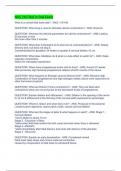Nsg 210 test 3 - Study guides, Class notes & Summaries
Looking for the best study guides, study notes and summaries about Nsg 210 test 3? On this page you'll find 74 study documents about Nsg 210 test 3.
All 74 results
Sort by
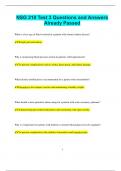
-
NSG 210 Test 3 Questions and Answers Already Passed
- Exam (elaborations) • 45 pages • 2024
- Available in package deal
-
- $11.99
- + learn more
NSG 210 Test 3 Questions and Answers Already Passed What is a key sign of fluid overload in a patient with chronic kidney disease? Weight gain and edema. Why is monitoring blood pressure critical in patients with hypertension? To prevent complications such as stroke, heart attack, and kidney damage. What lifestyle modification is recommended for a patient with osteoarthritis? Engaging in low-impact exercise and maintaining a healthy weight. What should a nurse prioritize when c...
NSG 210 Test 3 Final Exam.
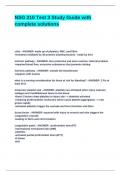
-
NSG 210 Test 3 Study Guide with complete solutions.
- Exam (elaborations) • 17 pages • 2024
-
- $11.99
- + learn more
clots made up of platelets, RBC, and fibrin -formation mediated by 30 proteins (clotting factors) - made by liver intrinsic pathway less protective and more reactive; internal problem -impaired blood flow, excessive substances that promote clotting Previous Play Next Rewind 10 seconds Move forward 10 seconds Unmute 0:00 / 0:15 Full screen Brainpower Read More extrinsic pathway outside the bloodstream -happens with trauma what is a nursing consideration fo...
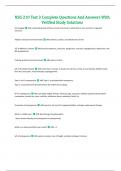
-
NSG 210 Test 3 Complete Questions And Answers With Verified Study Solutions
- Exam (elaborations) • 7 pages • 2024
- Available in package deal
-
- $11.99
- + learn more
NSG 210 Test 3 Complete Questions And Answers With Verified Study Solutions Acromegaly ANS continued growth of bone, hands, feet, face in adults due to over secretion of growth hormone Addison's disease hormonal levels ANS adrenal, cortisol, and aldosterone all low S/S of Addison's disease ANS muscle weakness, joint pain, weight loss, anorexia, hypoglycemia, depression, low BP, hyperkalemia Cushing syndrome hormone levels ANS excess cortisol
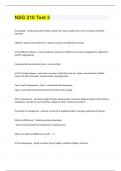
-
NSG 210 Test 3 With Correct Answers Latest Edition
- Exam (elaborations) • 8 pages • 2024
- Available in package deal
-
- $10.99
- + learn more
Acromegaly - continued growth of bone, hands, feet, face in adults due to over secretion of growth hormone Addison's disease hormonal levels - adrenal, cortisol, and aldosterone all low S/S of Addison's disease - muscle weakness, joint pain, weight loss, anorexia, hypoglycemia, depression, low BP, hyperkalemia Cushing syndrome hormone levels - excess cortisolNSG 210 Test 3 With Correct Answers Latest EditionNSG 210 Test 3 With Correct Answers Latest EditionNSG 210 Test 3 With Correct An...
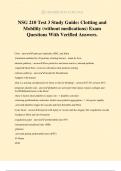
-
NSG 210 Test 3 Study Guide: Clotting and Mobility (without medications) Exam Questions With Verified Answers.
- Exam (elaborations) • 17 pages • 2024
- Available in package deal
-
- $12.49
- + learn more
NSG 210 Test 3 Study Guide: Clotting and Mobility (without medications) Exam Questions With Verified Answers. Clots - answermade up of platelets, RBC, and fibrin -formation mediated by 30 proteins (clotting factors) - made by liver intrinsic pathway - answerless protective and more reactive; internal problem -impaired blood flow, excessive substances that promote clotting extrinsic pathway - answeroutside the bloodstream -happens with trauma what is a nursing consideration for those at ...
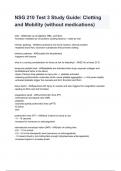
-
NSG 210 Test 3 Study Guide: Clotting and Mobility (without medications) questions and answers graded A+ 2024/2025
- Exam (elaborations) • 14 pages • 2024
- Available in package deal
-
- $9.99
- + learn more
NSG 210 Test 3 Study Guide: Clotting and Mobility (without medications) questions and answers graded A+ 2024/2025
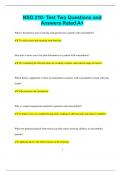
-
NSG 210- Test Two Questions and Answers Rated
- Exam (elaborations) • 33 pages • 2024
- Available in package deal
-
- $10.49
- + learn more
NSG 210- Test Two Questions and Answers Rated A+ What is the primary goal of nursing management for a patient with osteoarthritis? To relieve pain and maintain joint function. How does a nurse assess for joint deformities in a patient with osteoarthritis? By examining the affected joints for swelling, crepitus, and reduced range of motion. Which dietary supplement is often recommended to patients with osteoarthritis to help with joint health? Glucosamine and chondroitin. ...
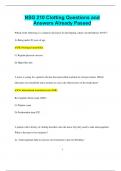
-
NSG 210 Clotting Questions and Answers Already Passed
- Exam (elaborations) • 45 pages • 2024
- Available in package deal
-
- $11.99
- + learn more
NSG 210 Clotting Questions and Answers Already Passed Which of the following is a common risk factor for developing a deep vein thrombosis (DVT)? A) Being under 30 years of age B) Prolonged immobility C) Regular physical exercise D) High-fiber diet A nurse is caring for a patient who has been prescribed warfarin for clot prevention. Which laboratory test should the nurse monitor to assess the effectiveness of the medication? A) International normalized ratio (INR) B) Complete blood...
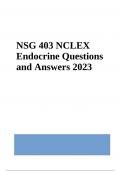
-
NSG 403 NCLEX Endocrine Questions With Answers Latest Updated 2024 (GRADED)
- Exam (elaborations) • 32 pages • 2024
- Available in package deal
-
- $18.49
- + learn more
NSG 403 NCLEX Endocrine Questions With Answers Latest Updated 2024 (GRADED) An agitated, confused female client arrives in the emergency department. Her history includes type 1 diabetes mellitus, hypertension, and angina pectoris. Assessment reveals pallor, diaphoresis, headache, and intense hunger. A stat blood glucose sample measures 42 mg/dl, and the client is treated for an acute hypoglycemic reaction. After recovery, the nurse teaches the client to treat hypoglycemia by ingesting: A....

Study stress? For sellers on Stuvia, these are actually golden times. KA-CHING! Earn from your study resources too and start uploading now. Discover all about earning on Stuvia

